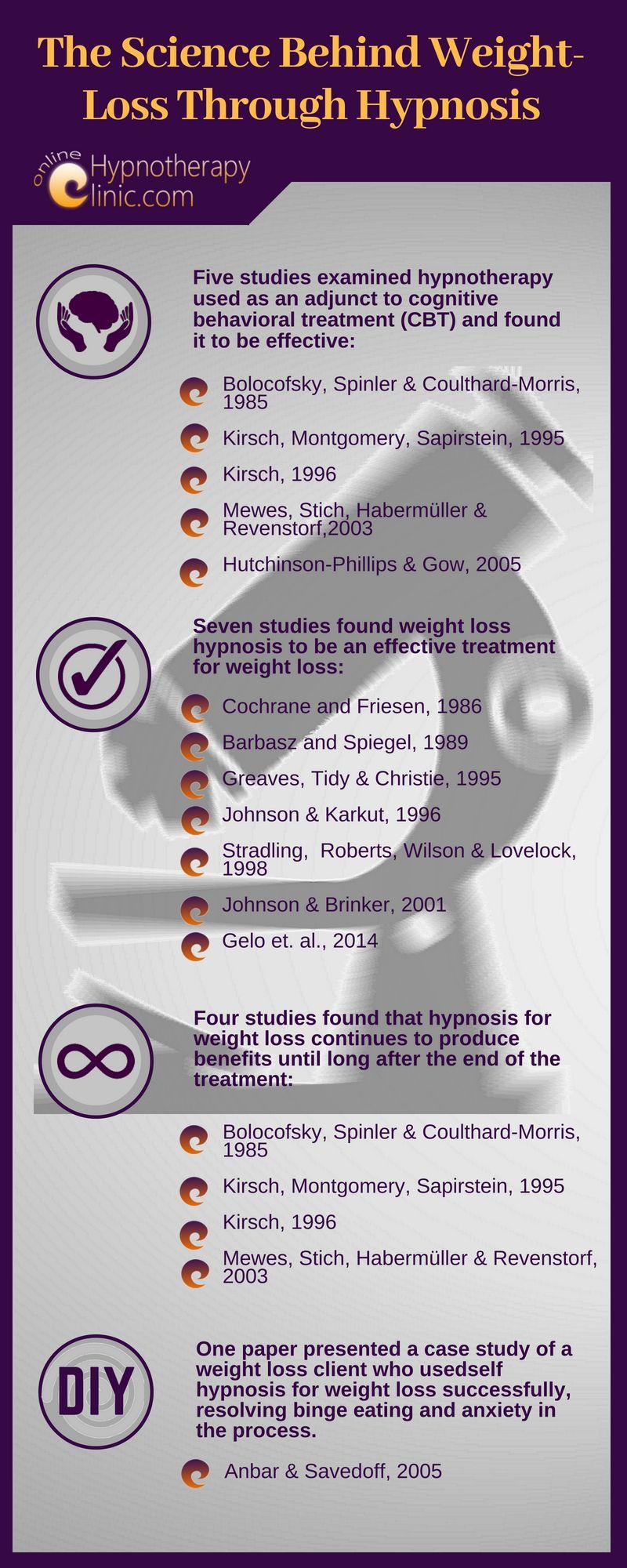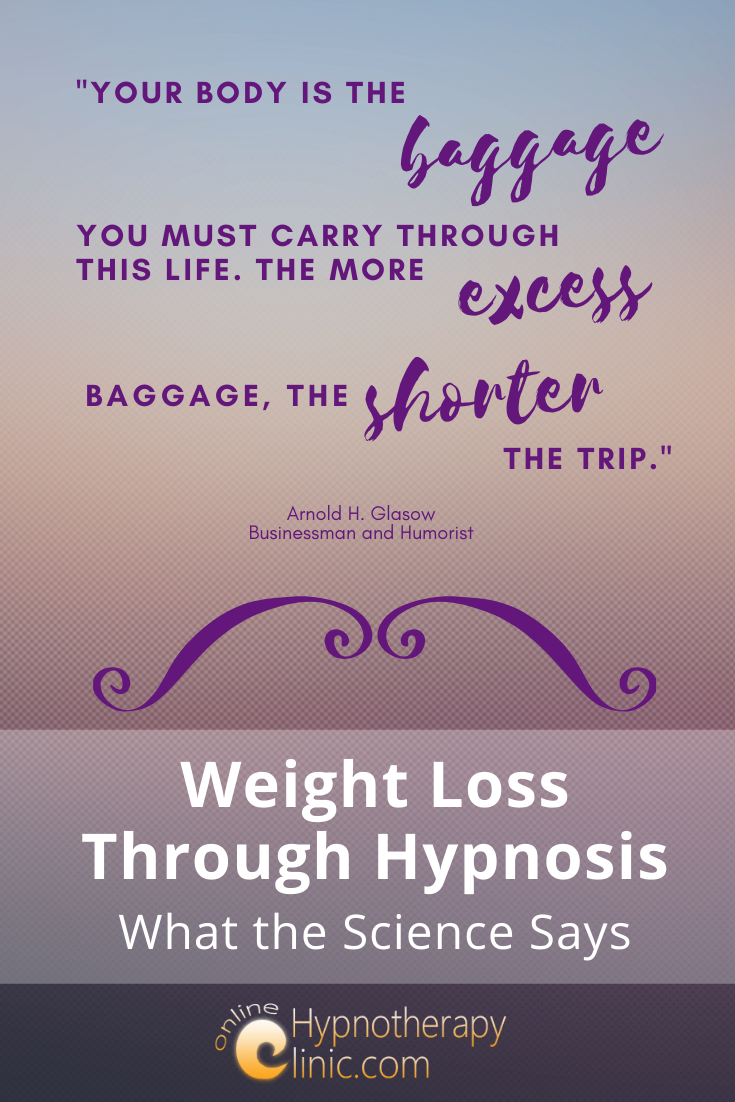Weight Loss Through Hypnosis- The Science
By Susanna Sweeney, MSC, MBACP, CHT
To be straight up from the start- weight loss through hypnosis is a vastly under researched field.
As you will see, there are a few researchers who- over the years have taken an interest and have had the funding to research different aspects of weight loss hypnosis, but by en large, the topic is much like a barren field.
Why is weight loss through Hypnosis under researched?
Good question.
The phenomenon in full detail:
- Most hypnosis research focuses on the brain state of hypnosis. Here, researchers are interested in finding out what exactly happens in the brain during hypnosis.
- Another stream of hypnosis research uses the state of hypnosis to examine other issues to do with the mind, such as the nature of consciousness, perception or memory.
- In contrast, the therapeutic use of hypnosis for any issue such as for depression, anxiety, weight loss or smoking cessation- although thousands of people change their lives with the help of hypnotherapy every year, is vastly under researched.
I have written about some of the background to
this in my article on the science behind stop smoking hypnosis- in
short, I believe the lack of research in this area is mainly due to economic reasons.
Personally,
I believe that hypnosis is hugely under used. If it was more widely
spread, a lot of issues that are treated with medical interventions could be
resolved the natural way, and at a substantial cost saving.
In the weight loss industry, a
myriad of drugs, some medical devices and surgical
procedures all add up to a multi-billion dollar market with much internal
competition. Each corner of the market wants to increase their profit
margins, or at least hold on to their slice.
And these powerful
industries have huge funds at their disposal not only for advertising,
but also to hold at bay any product or service which could potentially
replace medications, medical device products, or surgeries for weight
loss.
Universities- the centers of research- are closely tied in with industry these days. Investment in research
therefore will focus mostly on areas of benefit to large corporations.
So, for the purpose of this article, we will have to make do with the few studies there are.
Yet, you will see some impressive findings.
Research on the Efficacy of Weight Loss Through Hypnosis
I found seven studies that attest to the efficacy of weight loss hypnosis.
1) Cochrane and Friesen, 1986
For this study, 60 female participants, all overweight, were divided in three groups:
- Hypnosis plus audiotapes to listen to at home
- Hypnosis without audiotapes
- Control group
All groups were examined for weight loss, first immediately after the end of treatment and again six months post treatment. Subjects in both hypnosis groups lost significantly more weight than subjects in the control group, leading to the conclusion that hypnotherapy is an effective treatment for weight loss.
2) Barbasz and Spiegel, 1989
45 obese female subjects were divided into three groups and were treated in different ways:
- 14 participants in group A were taught a simple CBT self management technique only.
- 16 subjects in group B were taught the same CBT self management technique but also received hypnosis treatment alongside, but this treatment was not individualized, i.e. not adjusted to their own personal requirements.
- 15 subjects in group C were also taught the CBT self management technique and alongside received individualized hypnosis treatment.
Results:
- Group A lost an average of 1.3 kg.
- Group B lost an average of 3.4 kg.
- And finally group C lost an average of 6.4 kg.
The results attested to the efficacy of hypnosis as a weight loss treatment over CBT used on its own.
3) Greaves & Christie, 1995
Eight female subjects with clinical obesity issues received a hypnotherapy based weight loss program. All subjects lost significant amounts of weight. At the final follow up two years after the end of treatment, six of the eight subjects had maintained a reduced body weight compared with their weight prior to treatment.
4) Johnson & Karkut, 1996
172 overweight female subjects were treated for obesity in the following ways:
- 86 received hypnosis treatment for weight loss.
- 86 received a hypnosis treatment accompanied with aversion treatment.
Both groups achieved significant weight loss, attesting to the efficacy of hypnosis as a treatment for weight loss.
5) Stradling, Roberts, Wilson and Lovelock, 1998
- In this U.K based study 60 obese patients were divided into three groups.
- Two of those groups each received a different hypnosis treatment for weight loss alongside dietary advice, the first brief and directed at energy intake reduction, the other more in-depth and directed at stress reduction. The third group received only dietary advice.
- Weight loss in subjects was recorded regularly up until 18 months post treatment.
- While all three groups lost weight initially, at 18 months only the group who received an in-depth hypnotherapy treatment directed at stress reduction alongside dietary advice continued to lose weight.
- This showed statistically significant results in favor of weight loss through hypnosis.
6) Johnson & Brinker, 2001
Subjects were divided into three groups as follows:
- Treatment I- diet and hypnosis
- Treatment II- aversion treatment followed by diet and hypnosis
- Treatment III- aversion treatment, diet, hypnosis, nutritional analysis and supplements
All groups lost significant amounts of weight and reduced their Body Mass Index (BMI), with groups II and III losing more weight than group I, indicating that weight loss through hypnosis is an effective treatment.
7) Gelo, Zips, Ponocny-Seliger, Neumann, Balugani & Gold, 2014
Sixty obese female subjects were treated for weight loss with either:
- Cognitive behavioral exercises plus hypnosis
- Cognitive behavioral exercises plus hypnosis plus acupressure
Treatments were delivered as 12 sessions over 8.5 months and lasted 120 minutes each. They started with cognitive behavioral exercises followed by a hypnosis session, reflections and homework directions.
Both groups lost significant amounts of weight, with the acupressure group continuing to lose weight at 18 months post treatment. This study showed that weight loss through hypnosis is an effective treatment.
The Efficacy of Weight Loss Through Hypnosis as an Adjunct to Cognitive Behavioural Treatment (CBT)
Hypnosis
has become popular with clinicians as an adjunct to cognitive behavioral treatment
(CBT) for weight loss. I found five studies which examined the use of
weight loss through hypnosis alongside CBT:
1) Bolocofsky, Spinler & Coulthard-Morris, 1985
109
subjects completed CBT treatment for weight loss- either with or
without the addition of hypnosis. At the end of the 9‐week program, both
interventions resulted in significant weight reduction.
However, at
the 8‐month and 2‐year follow‐ups, the subjects who had experienced
weight loss through hypnosis showed significant additional weight loss,
while those in the CBT group exhibited little further change.
2) Kirsch, Montgomery, Sapirstein, 1995
This
is a meta-analysis of 18 studies focusing on hypnosis as an adjunct to
CBT. The findings were quite remarkable- weight loss hypnosis was found
to increase the treatment benefits of CBT by some 70%.
Most
notably, the clients who were treated with hypnosis alongside CBT
continued to gain from the treatment continued to lose weight long
after the treatment was finished, where those who had only been treated
with CBT did not.
3) Kirsch, 1996
This meta-analysis
examined six different studies that examined the combination of CBT with
hypnosis. Participants who had experienced weight loss through hypnosis
alongside CBT lost more than double the weight compared to those who
were only treated with CBT.
4) Mewes, Stich, Habermüller & Revenstorf, 2003
43 obese women were treated either with CBT and hypnotherapy or CBT on its own. Both groups achieved significant weight loss.
The group treated with hypnotherapy had much enhanced long term weight loss which continued until long after the treatment stopped.
5) Hutchinson-Phillips & Gow, 2005
Hutchinson-Phillips
and Gow reviewed the literature around weight loss through hypnosis
combined with CBT, such as treatment protocols and other articles on the
topic. They concluded that CBT- out of all the available treatment
options for obesity had the best empirical record in treating obesity
and that weight loss hypnosis was a useful adjunct to CBT in treating obesity.
With Hypnosis, Subjects Continue to Lose Weight Long After the End of Treatment
Four of the studies above had results where weight loss hypnosis stood out for subjects continuing to lose weight long after the end of treatment:
- Bolocofsky, Spinler & Coulthard-Morris, 1985. At the 8‐month and 2‐year follow‐ups, those subjects who had experienced weight loss through hypnosis showed significant additional weight loss, while those in the CBT group exhibited little further change.
- Kirsch, Montgomery, Sapirstein, 1995. Those subjects who were treated with hypnosis (alongside CBT) continued to lose weight long after the treatment was finished, where those who had only been treated with CBT did not.
- Stradling, Roberts, Wilson and Lovelock, 1998. Here, subjects who had received an in-depth hypnosis treatment aimed at stress reduction, at the 18 months follow up, were found to still be losing weight, where subjects from the other groups were not.
- Mewes, Stich, Habermüller & Revenstorf, 2003. The group treated with hypnotherapy had much enhanced long term weight loss which continued until long after the treatment stopped.
Different Types of Hypnosis Treatments Will Produce Different Results
The findings of three studies (Barbasz and Spiegel, 1989; Stradling, Roberts, Wilson and Lovelock, 1998; and Gelo, Zips, Ponocny-Seliger, Neumann, Balugani & Gold, 2014) indicate that the exact nature of the hypnotherapy treatment is important and will have an impact on the results of weight loss:
- Individualized hypnotherapy treatments (Barbasz and Spiegel, 1989) can be expected to produce better result than generic ones.
- More in-depth hypnotherapy treatments can be expected to produce better results than generic or shallow ones (Stradling, Roberts, Wilson and Lovelock, 1998).
- The results of hypnosis for weight loss treatments can be enhanced by including techniques from other therapies (Gelo, Zips, Ponocny-Seliger, Neumann, Balugani & Gold, 2014)
So, in Practice, What Does all This Mean for You?
Good question.
First off, if you are interested in taking a program of weight loss hypnosis, you can rest assured that there is some scientific evidence that attests to its efficacy.
Secondly, the findings on different types of hypnosis treatments producing different results mean that if you are considering weight loss through hypnosis, it is really worth your while doing your research about the types of programs offered by different weight loss hypnotists. For example, you will want to know what these programs include, whether or not programs are individualized. I recommend that you research potential hypnotherapists and their offerings thoroughly before you book.
For more tips on this research have a look at my article 'Quit Smoking Hypnotist- 9 Things to Consider Before You Book'. Even though directed at a different type of hypnotherapy treatment, many of the questions you will want to ask will be the same, or similar.
So, What Does Science Say- Overall?
I introduced you to the studies I was able to find in my research.
I found 13 studies that were conducted over a period of 30 years- not exactly a significant body of research.
However, all 13 do support weight loss through hypnosis as an effective treatment.
Are you going to give it a go?
Regards,

More About Weight Loss Hypnosis
Weight Loss Through Hypnosis- What Science Says
Hypnotherapy is often portrayed as unscientific. In this article I have gathered the available scientific evidence that backs weight loss through hypnosis as a valid and valuable treatment...
Hypnotic Weight Loss- How to Get the Best from Your Treatment
This article advises you as to what you can do in order to get the best out of your treatment if you have decided to lose weight through hypnosis. Some of this is bound to surprise you...
Could You Lose Weight By Hypnosis?
Find out if weight loss hypnosis is suitable for you, what the underlying issues may be and what to expect from a program of hypnosis.
Gastric band hypnosis has become a popular alternative to actual surgical intervention. But does it live up to expectations? Find out what it does and what results you can expect.
Weight Loss Hypnotists- How to Find the Right one for You
It can be very daunting to look for a practitioner of a therapy you have never tried and heard mixed things about. Let me hold your hand with some sound advice...
Weight Loss by Hypnosis- 7 Benefits for You
Find out how you could benefit from weight loss by hypnosis.
Quit Smoking Without Gaining Weight
Find sound advice and guidance if you want to quit smoking without gaining weight.
Self Hypnosis for Weight Loss- 7 Huge Benefits for You
Find out what benefits self hypnosis for weight loss has on offer for you compared to conventional weight loss programs and compared to attending weight loss hypnosis.
References:
Anbar & Savedoff, 2005. Treatment of Binge Eating
with Automatic Word Processing and Self Hypnosis: A Case Report,
American Journal of Clinical Hypnosis, 48:2-3, 191-198
Barbasz & Spiegel, 1989. Hypnotizability and Weight Loss in Obese Subjects. Journal of Eating Disorders, May 1989.
Bolocofsky,
Spinler & Coulthard-Morris, 1985. Effectiveness of Hypnosis as an
Adjunct to Behavioral Weight Management Journal of Clinical Psychology.
January, 1985, Vol. 41, No. 1.
Cochrane & Friesen,
1986. Hypnotherapy in Weight Loss Treatment. Journal of Consulting and
Clinical Psychology, 1986, Vol. 54, No. 4.
Gelo, Zips, Ponocny-Seliger, Neumann,
Balugani & Gold, 2014. Hypnobehavioral and Hypnoenergetic Therapy
in the Treatment of Obese
Women: A Pragmatic Randomized Clinical Trial, International Journal of
Clinical and Experimental Hypnosis, 62:3
Greaves, Tidy &
Christie, 1995. Hypnotherapy as an adjunct to the dietetic management of
obese patients. Nutrition & Food Science, Vol. 95 Issue: 6,
pp.15-18.
Hutchinson-Phillips & Gow, 2005. Hypnosis as an
Adjunct to CBT: Treating Self-defeating Eaters. Journal of Cognitive and
Behavioral Psychotherapies, Vol. 5/2, 113-138.
Johnson &
Brinker, 2001. A Comparative Study of Multi-component Weight Loss
Treatments: A Replication and Exploratory Look at Female Smokers,
Non-smokers, and Participant BMIs. North American Journal of Psychology.
2001, Vol. 3 Issue 1, p13. 18p.
Johnson & Karkut, 1996.
Participation in Multicomponent Hypnosis Treatment Programs for Women's
Weight Loss with and without Overt Aversion. Psychological Reports,
1996, Vol.79/2, pp.659-668
Kirsch, 1996. Hypnotic Enhancement of
Cognitive-Behavioral Weight Loss Treatments—Another Meta-Reanalysis.
Journal of Consulting and Clinical Psychology, 1996, Vol.64, No. 3,
517-519.
Kirsch, Montgomery, Sapirstein, 1995. Hypnosis as an
adjunct to cognitive-behavioral psychotherapy: A meta-analysis. Journal
of Consulting and Clinical Psychology, Vol 63/2, Apr 1995, 214-220
Mewes,
Stich, Habermüller & Revenstorf, 2003. Weight reduction by hypnosis
and behaviour therapy. Verhaltenstherapie und Verhaltensmedizin, 24,
499–512.
Stradling, Roberts, Wilson & Lovelock, 1998.
Controlled trial of hypnotherapy for weight loss in patients with
obstructive sleep apnoea. International Journal of Obesity, 1998/28.
Recent Articles
-
Havening Technique Training auf Deutsch
Apr 18, 25 02:59 AM
Havening Technique Training auf Deutsch- Details und Buchung -
Client Testimonials
Oct 06, 23 06:08 AM
Client Testimonials of my Online REPAIRenting® Program that uses various psychosensory approaches for safe and quick transformation -
Smoke Free Thanks to This Amazing Resource
Aug 02, 23 09:26 AM
Oh thank you for this simple resolution to all my worries! I feel like I have had a weight lifted off my shoulders. It is like cheating on giving up smoking.




New! Comments
What do you think? Leave a comment in the box below.